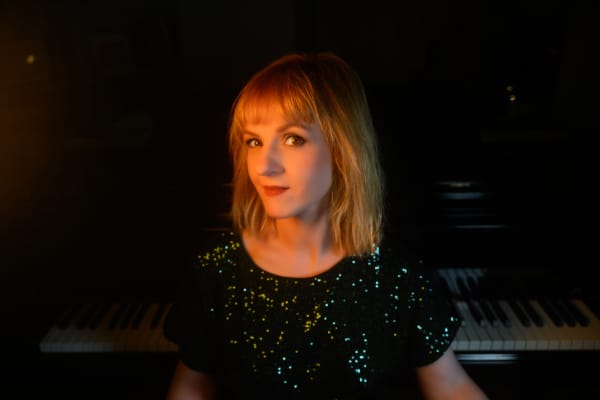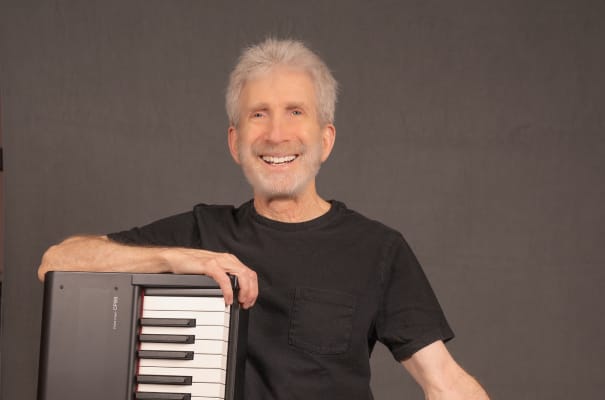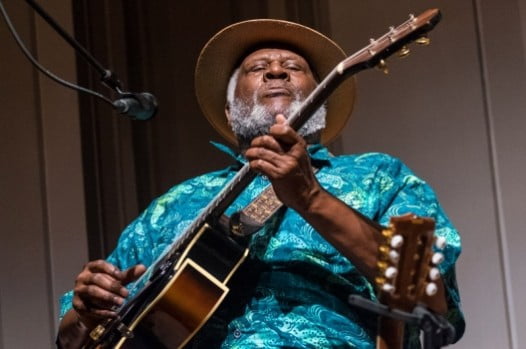Jazz interview with jazz pianist James Weidman. An interview by email in writing.
JazzBluesNews.Space: – First let’s start with where you grew up, and what got you interested in music?
James Weidman: – I grew up in Youngstown Ohio. It was a musical household. My father James Sr. played clarinet and saxophone and was a bandleader. Musicians rehearsed regularly at the house. My mother Gertrude took me to choir rehearsals where she sang soprano in the church choir. She played a little piano.
JBN.S: – What got you interested in picking up the piano? What teacher or teachers helped you progress to the level of playing you have today? What made you choose the piano?
JW: – There was a piano in the house. When I was five, George Jones who wrote the hit song “Rama Dama Ding Dong” showed me some rock and roll grooves on the piano. My father taught me blues progressions. That was the first music that I made. Also, at the time I remember liking the drums and had a toy drum set and a small military toy drum. but my Mom was not feeling all the noise I was creating.
It was decided that I should learn piano formally when I was age 7. I did enjoyed this new activity right away. In fact, I couldn’t wait to get out of the elementary books and to play at a more advanced level. So, I practiced dutifully. I also liked to embellish my study pieces with my own ideas.
I feel that my undergraduate years of study definitely helped to lay a foundation that led me to where I am now. There were many people along the way who taught me invaluable things. Also recordings, musician interviews, books helped to deepen my knowledge and aesthetic. The teacher that helped me with my technique and my understanding of the piano and the interpretation of the piano repertoire of the European tradition was Marceline Mayhall my teacher at Youngstown State University. I played in local bands at the time as well, working on my jazz technique. I got more involved with the YSU jazz ensemble in my last two years as a student. During that time Tony Leonardi was the jazz professor. That was a great learning experience as well. Thad Jones came to our school did a workshop and directed the band. He proclaimed to me somewhat cryptically that “a piano player can never make a mistake!”
JBN.S: – How did your sound evolve over time? What did you do to find and develop your sound?
JW: – I think the sound that one creates is largely dependent upon the ear. One’s taste has a lot to do with it as well. As a performance major, I learned various touches and techniques that could be applied to the piano. But after I finished school and when at that point I decided to embark on a career in jazz my biggest task was the further developing my jazz ear. I think playing with great sympathetic musicians with great individual sounds is a great way to get your sound together. For the pianist in my opinion, there is nothing better than being in a well sounding, like minded rhythm section. That being said I think my idea of sound has somewhat evolved lately. Some of that is attributed to the fact that lately I had been playing trio at least once a month for two years. It has made me laser focus on fine tuning my concept of the art of trio playing in relation to the sound I wish to project.
JBN.S: – What practice routine or exercise have you developed to maintain and improve your current musical ability especially pertaining to rhythm?
JW: – All of my teachers were sticklers for rhythm. It was something that I was made to be aware of early. Obviously, I learned a lot about rhythmic flexible and possibilities from Steve Coleman. Also, studying clave styles, African 6/4 metered time lines, Brazilian, and contemporary grooves all help in developing a rhythmic vocabulary. I have observed that the musicians who have a secure grasp of time have triple and duple feels concurrently implied in their playing.
JBN.S: – Which harmonies and harmonic patterns do you prefer now?
JW: – I love harmonic movements that suggest some kind of mood and color. A lot of harmony is situational. The blues sound is very harmonic. What type of harmony used posits certain questions. How complex should it be? Are you playing solo or with vocalist or saxophone? What would most compliment? Mastering harmonic language is a lifelong project. There are many great harmonists that I stand on the shoulders of, Tatum, Monk, Herbie, Oscar, Cedar Walton, Tommy Flanagan and Bill Evans. As a rule, I personally like resonant harmonies even in atonal type situations. My universal idea of resonance can be thought simply as all music being harmonically a combination of perfect 5ths and major 3rds.

JBN.S: – What do you love most about your new album 2018: <Spiritual Impressions>, how it was formed and what you are working on today?
JW: – What made me happiest of all what’s the contributions of the individual musicians on this project. Ruth Naomi Floyd and her beautiful interpretations Anthony Nelson who is pitch perfect on all the instruments he played. Not enough can be said about the contributions of Harvie S and Vince Ector. Everyone involved made the Spiritual Impressions project a lot of fun and very fulfilling.
I am working on coordinating things for Spiritual Impressions performances. Later this year, The Aperturistic Trio with Harvie S and Steve Williams will record a new project. We are looking at perhaps doing a tour. I also have on the planning board a series of solo projects.
JBN.S: – Which are the best jazz albums for you of 2017 year?
JW: – Unfortunately, I had not had the time I would like to listen to very many new recordings of last year but the ones that caught my ear were Steve Coleman Morphogenisis and Nicole Mitchell Mandoria Awakening II. I heard other day part of the Thelonious Monk “Les Liason Dangereuses! Wow!
JBN.S: – What’s the balance in music between intellect and soul?
JW: – I think the best music created is when soulfulness is paramount. I like listeners not to get too caught up intellectually in the under-hood things that go on in creating music. Certainly when a musician is performing, I don’t want to get the idea that they are all caught up in their thought processes. But the intellect is important for the road to mastery: reflecting, analyzing and solving musical problems.
JBN.S: – Please any memories from gigs, jams, open acts and studio sessions which you’d like to share with us?
JW: – I remember Max Roach came to Youngstown State University while I was still a student. I had just started to hang out a little with the YSU jazz cats. Dave Lalama pianist asked me to sit in with the college group one tune, Denzil Best’s “Move”! This was of course my first time playing with a giant like Mr. Roach. I was listening a lot to Charlie Parker’s music and the Brown/ Roach band so I kind of generally knew what to expect rhythmically But I remember how relaxed, precise he played that rather fast tempo. I was in heaven.
JBN.S: – Many aspiring musicians are always looking for advice when navigating thru the music business. Is there any piece of advice you can offer to aspiring students or even your peers that you believe will help them succeed and stay positive in this business?
JW: – One can first take solace in that the music business has never been easy. Landscape has indeed changed even in the last five years. These are difficult times, because of the commoditizing of everything for profit. A craft such as jazz music does not fit into this paradigm. The recording industry has pretty much wrecked what we earlier knew as pop music. But we artist/ musicians must remain hopeful and continual believe in our value. The plusses we have today is that there are platforms like social media. I think that taking a grass roots approach in navigating one’s career and developing one’s audience is a viable and necessary option A lot more people are doing what I have done more or less for years, DIY. Doing this work is a labor of love. When the going gets tough, I just remind myself traveling down this road was not a bed of roses for many great artists that came before.
JBN.S: – Аnd furthermore, can jazz be a business today or someday?
JW: – Do you mean a business akin to the one a Beyoncé is in? You know the old joke of how one becomes a millionaire in jazz? Invest 2 million. Jazz again is a craft and a career. One should have a prerequisite the acumen and hopefully the physical ability to be able to support themselves and manage their money. if one decides to do this work, one has to figure how much money one really needs. Of course, corporate power and the greed of the oligarchs has made this harder to navigate and not only for musicians. A society where everything, human beings, nature, and music is destroyed for profit is a destructive non-creative way of life. Music is on the creative side of life and again I remain hopeful that enough people still find it important.
JBN.S: – Which collaboration have been the most important experiences for you?
JW: – Abbey Lincoln, Steve Coleman, Joe Lovano are three collaborations that stand out. Abbey for the humanitarian and force of nature she was, Steve for his endless pursuit of musical knowledge. Joe for his “jazz free” let it happen approach.
JBN.S: – How can we get young people interested in jazz when most of the standard tunes are half a century old?
JW: – A big part of the problem is the control of information flow and mind conditioning by the media. When you get around to hearing something that is not in the bubble created for you, it becomes a problem. People’s traditions and tastes use to move must slower and certainly humans in an earlier age before the industrial and technological revolution. We are witnessing a new world order.
I hear that in some institutions that foster jazz programs, many students are disinterested in learning standard repertoire. At William Paterson University where I teach, not so much. The young musicians see the standards whether they be the American Songbook or the Jazz Canon as something that they can learn from and can inform them as they later go out and create their individual sonic experiences. They understand it as studying a discipline.
JBN.S: – John Coltrane said that music was his spirit. How do you understand the spirit and the meaning of life?
JW: – My understanding is that we play the spiritual living entities that we are. I play my life, my history. That is all I have. In so far as the explaining the meaning of life, maybe music expresses that better than actual words. You can dispute a spoken word but like W. A. Mathieu said, in music you get what you receive. That, if your ears are open and receptive.
JBN.S: – What are your expectations of the future? What brings you fear or anxiety?
JW: – I am by nature positive. I don’t fret over things I cannot control. Being totally in the moment will take care of tomorrow.
JBN.S: – If you could change one thing in the musical world and it would become a reality, what would that be?
JW: – I would wish that the division of the musical world and the day to day world would not be. That music would be seen as an essential part of life, and all peoples would tap into their musical, dancing and creative souls.
JBN.S: – What’s the next musical frontier for you?
JW: – I can’t predict my future other than to say I hope to stay on the path of musical betterment. I hope to continue to create and perform my music and that there will be people who will want to follow my personal journey.
JBN.S: – Are there any similarities between jazz and world music, including folk music?
JW: – To me jazz as a whole is a creative, fluid, improvised music that suggests all kinds of music possibilities. Jazz in the beginning started a folk art. Even then early jazz artists would take all the music known to them that they like and incorporate it. Even more so today, Jazz is like tofu, capable of absorbing all the flavors around it. Louis Armstrong supposedly said that “all music is folk music. Never heard a horse sing a song.”
JBN.S: – Who do you find yourself listening to these days?
JW: – Regularly I had been listening to a lot of Art Tatum. Besides his exquisite harmonies and phenomenal runs, I have been into his beautiful touch and attack. Besides Tatum I love listening to Afro-Cuban and Latin Jazz. I don’t have time to listen to as many things I’d like. I do love all checking out all genres of music especially if it is honest and creative.
JBN.S: – Let’s take a trip with a time machine, so where and why would you really wanna go?
JW: – That I could go back in a time capsule and hear in person the many great artists of the past, famous or not.
JBN.S: – I have been asking you so far, now may I have a question from yourself…
JW: – Why you ask me so many questions, Simon?
JBN.S: – Thanks so much for interesting answers !!! Not only you. To more reveal who the musician is, the attitudes of life and the field.
Interview by Simon Sargsyan











Leave a Reply